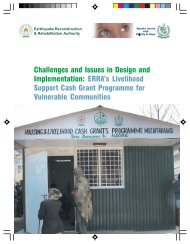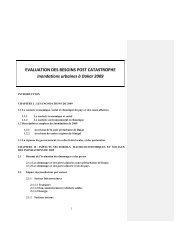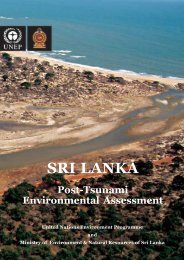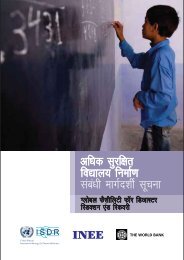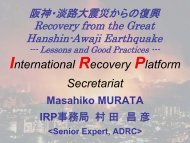Aceh Emergency Response and Transitional Recovery ... - UNDP
Aceh Emergency Response and Transitional Recovery ... - UNDP
Aceh Emergency Response and Transitional Recovery ... - UNDP
You also want an ePaper? Increase the reach of your titles
YUMPU automatically turns print PDFs into web optimized ePapers that Google loves.
Lessons Learned<br />
M<br />
ajor disasters such as the 26 December 2004 tsunami seriously test the<br />
ability <strong>and</strong> capacity of the international humanitarian <strong>and</strong> development<br />
community to respond rapidly <strong>and</strong> effectively, as well as to ensure<br />
proper approaches <strong>and</strong> mechanisms towards smoothening the transition<br />
from emergency relief to recovery <strong>and</strong> longer term reconstruction. Challenges<br />
experienced <strong>and</strong> methods to address them create an important opportunity to learn<br />
lessons, <strong>and</strong> to institutionalize means of ensuring these lessons are incorporated<br />
into future efforts.<br />
<strong>UNDP</strong> has participated in <strong>and</strong> supported a number of lessons learned events undertaken<br />
by the UN system throughout 2005. <strong>UNDP</strong> will also undertake a formal<br />
process early in the New Year to document lessons learned in response to the tsunami<br />
disaster. However, the following provide an early indication of lessons<br />
learned thus far in <strong>UNDP</strong>'s tsunami response efforts.<br />
Table 11 -- Lessons Learned Matrix<br />
Area Success Factors Challenges<br />
• Immediate employment efforts<br />
provide a good basis for<br />
early engagement of affected<br />
communities to generate lost<br />
income to meet basic needs,<br />
ameliorate trauma, <strong>and</strong> most<br />
especially to serve as an entry<br />
point for medium- <strong>and</strong> longerterm<br />
sustainable livelihoods interventions.<br />
• Early agreement on st<strong>and</strong>ards<br />
for "cash for work" helped to<br />
provide level benefits to beneficiaries<br />
<strong>and</strong> prevent competition<br />
between organizations.<br />
• Early investment in waste<br />
management created significant<br />
opportunities for linking<br />
clean-up efforts into longerterm<br />
waste management improvements<br />
<strong>and</strong> recycling initiatives.<br />
(1) Immediate<br />
Employment<br />
<strong>and</strong> Labour<br />
(2) <strong>Recovery</strong> of<br />
Livelihoods<br />
• Early support for "cash for<br />
work" activities allowed part-<br />
• Gender must be a focus from<br />
the beginning in order to ensure<br />
better targeting of employment<br />
schemes.<br />
• St<strong>and</strong>ard methods <strong>and</strong> formats<br />
for managing "cash for work"<br />
should be developed <strong>and</strong><br />
shared to reduce formulation<br />
periods in the early aftermath<br />
of disasters.<br />
• <strong>UNDP</strong> requires more flexible<br />
partnership modalities to rapidly<br />
engage NGOs undertaking<br />
emergency operations.<br />
• Lack of reliable available information<br />
in the initial aftermath<br />
of a disaster on this scale<br />
makes planning <strong>and</strong> formulation<br />
difficult, so modalities are<br />
required to link assessment directly<br />
into delivery.<br />
• Appropriateness of temporary<br />
employment schemes needs to<br />
be closely monitored at local<br />
levels since the transition to<br />
livelihoods support can happen<br />
earlier in some areas than<br />
others (considering local resource<br />
bases, income opportunities,<br />
etc.).<br />
• Procurement capacity <strong>and</strong><br />
procedural issues delayed con-<br />
38


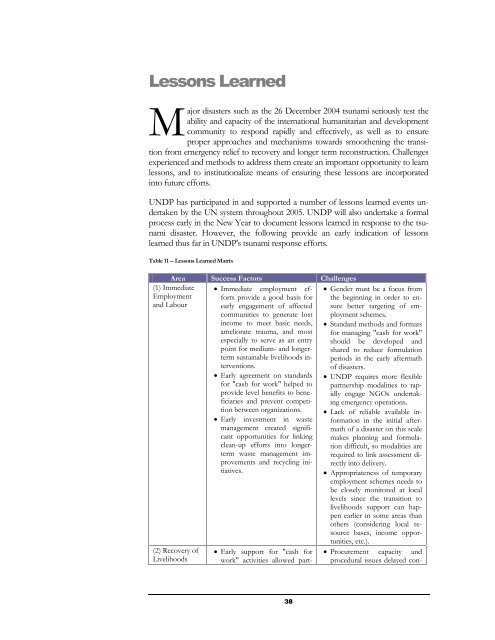

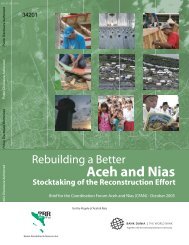
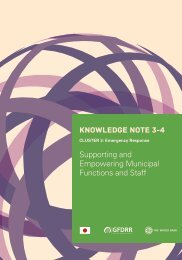
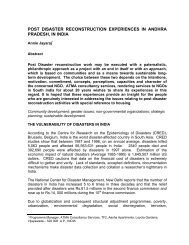
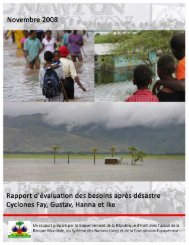
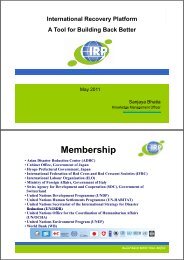
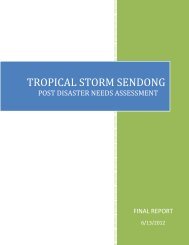
![View full document [PDF 7.65 MB] - unisdr](https://img.yumpu.com/48902806/1/178x260/view-full-document-pdf-765-mb-unisdr.jpg?quality=85)
